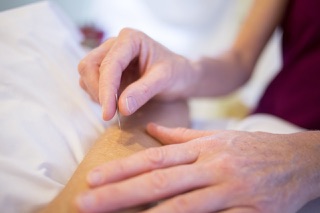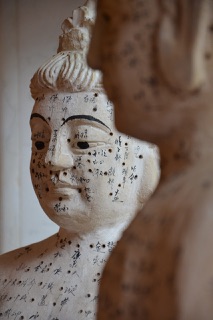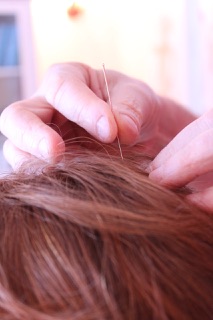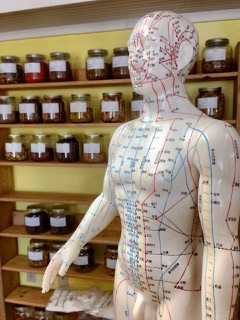Questions I have received:
I recently went to an Acupuncture session and I got a big red splotch on one of the needle sites. I also had strange memories or visions after. I am experiencing a full kundalini awakening (I think I am in the second stage? Note: from my book, Working with Kundalini) Is Acupuncture okay for people undergoing kundalini awakening?
I was in a support group and the mod said that acupuncture can’t help kundalini awakening because it is a different system. I know you are an acupuncturist so could you comment on this?

To begin, it is helpful to understand a bit about how Acupuncturists work. An Acupuncturist will note whatever label or diagnosis you have but will then do a full systems review on you as an individual, often palpating (for example, your abdomen or some of the energy channels of your body), feeling your pulse (which is a whole system that indicates patterns of dysfunction in the whole body), and looking at your tongue (again, a map that shows patterns of disharmony in the body).
Acupuncturists base their differential diagnosis and how they will treat you based off of this. Put more simply, an acupuncturist will want to know your whole picture– everything from spiritual issues to what your poop looks like, and based off of that they will come up with their treatment plan.
That being said, some acupuncturists will have specialties, and some of the more common ones include pain (sports medicine) and fertility. This does not mean that they cannot treat matters of spirit, but any body-mind-spirit modality, even one based in energy medicine, when it achieves popularity will eventually gravitate more towards a body-mind modality, and then a body-based modality. For example, some acupuncturists believe that acupuncture works by stimulating neuromuscular junctions. While they may be correct, there can then be dismissal of spiritual and energetic conditions from some practitioners who are more interested in scientism than anything else.
There will also be acupuncturists who specialize in emotional and spiritual health concerns. The tricky part about this is that someone who says they specialize in sports medicine may be a compassionate and curious person who is excited to treat you and someone who says they specialize in spiritual health concerns may be an arrogant jerk.
This is why I suggest to anyone to ask questions prior to booking, and to look at the practitioner’s background. If their background includes considerable energetic and spiritual exploration, that would be a good indicator that they may be able to help.

Acupuncture itself works by moving energy through the body. Picture each acupuncture needle as a sort of tiny flag or conductor. In energy medicine terms acupuncture points can be considered as microchakras. The acupuncturist will use specific insertion methods to either stimulate or tonify (bring energy or cause blocked energy to flow through) the channel.
We have energy channels (or meridians) going through our entire body. Most of them are named after organs, as the channel goes through that organ. For example, the primary Liver channel will go through the Liver organ and then go down the leg and out the big toe. By placing an acupuncture needle in this meridian the acupuncturist is seeking to move energy through the entire channel or to bring energy into the channel.
Sometimes individuals experiencing kundalini awakening are too deficient to be able to have much energy moving (acupuncture) occur. In this case acupuncturists often have other methods, such as moxibustion (burning mugwort on acupuncture points to bring up energy levels), acupressure, or non-insertion methods (Japanese and Toyohari-style acupuncturists are especially adept at doing things like holding needles at acupuncture points to create a positive reaction without moving much energy). Many acupuncturists are also herbalists, or trained in forms of bodywork that can be utilized instead of acupuncture.

So what is deficiency? It’s main symptom is complete and utter exhaustion. There typically is pallor to the face and a weak pulse, but basically if you want to go to bed at five p.m. every day (if you had a choice) you may need to be built up energetically a bit before moving energy can happen.
So as for your reaction (the first question)… what it sounds like to me is that you have a “deficient heat” pattern, which is common in kundalini awakening. It sounds like some heat was released in your system, causing the red blotches and some energy was moved (in a positive way) letting your mind and spirit process some stuck energy.
Acupuncture can be a wonderful way to get things moving again. So for feelings of being stuck emotionally or spiritually it can be enormously beneficial. Often people stagnate because of stagnant energy in their body, and acupuncture is a way to resolve that blockage and inspire flow.
It is also wonderful at soothing “excess” emotions, so any large emotions arising (such as depression, anxiety, insomnia, grief) that you are having trouble wading through, acupuncture can help.
As for the second question. Technically the word “kundalini” is not going to appear in the extensive (as in thousands of years old up to the present) literature on Chinese medicine. If it does, it is going to be modern and likely the result of a modern day practitioner who has experienced kundalini awakening stating their experience with it in a TCM (Chinese medicine) framework.
That being said, that specific term may not appear but treatments for what may be called “zen sickness” or “Qi-gong related disorders” will be discussed. Basically the same issues that appear in “kundalini awakenings”– spiritual awakening or spiritual experiences creating significant disharmonies of mind, body, and spirit.

Throughout history similar terms have emerged to describe similar phenomena. For example, similar forms of shamanism and ritual have appeared in widely disparate countries. They may have different names, or surface-level differences, but eventually people have found things that work in regards to connecting with spirit, ancestors, and the land, and they will be strikingly similar.
This same thing happens with energetic and spiritual issues as well. Just because the term “kundalini” was the one that was popularized in modern-day spiritual circles doesn’t mean that cultures and modalities outside of those traditions wouldn’t recognize it or cannot treat it.
I will mention with kundalini awakenings the real issue will rarely be the kundalini awakening itself. Kundalini is consciousness; the real question is what is getting in the way of that consciousness fully flowing through the system.
The answer to this will be a wide variety of physical and emotional issues; pain, stuckness, prior traumas, depression/anxiety. It may also be more existential or identity-based issues: fear of death, fear of being alive, thoughts about the self and the world (our relationship with reality).
It is also the ego. Our ego is basically our identity and serves as a sort of protective mechanism against change. We deny or obscure things that would be too threatening to what our identity and beliefs are.
The point here is that any good acupuncturist (or holistic practitioner, bodyworker, energy worker, spiritual healer) will consider the label of what you are going through, take it into consideration, and then treat you as a person.
Even if they have not heard of kundalini awakening, there is now plenty of material out there (may I be so bold as to suggest my books, Working with Kundalini or The Spiritual Awakening Guide) for someone to get an understanding of what kundalini awakening is in order to treat it.
Mary Mueller Shutan is a spiritual teacher and author of several books, including the upcoming book (available now for pre-order) Shadow Work for the Soul.

Hi Will-
I hope the Zero Balancing helps. I agree with what you are saying here… if I were talking to practitioners or people who have experienced a lot of different healing modalities I would tell them to seek out the best practitioner, rather than focusing on the modality/technique. That is a lot to ask for most folks, though.
Thanks for this Mary. I have had considerable pain in my middle back for a number of years which causes very erratic sleep patterns. I have booked myself in to have some Zero Balancing sessions to help clear the blockage. I have also found acupuncture to be very hit and miss depending on the practitioner. I found a practitioner who was having a Kundalini awakening and his first session gave me a huge release, while other practitioners didn’t really help.